Histórico
A Pontifícia Universidade Católica do Rio de Janeiro (PUC-Rio) foi fundada em 1941, pelo Cardeal Sebastião Leme e pelo Pe. Leonel Franca, SJ, e reconhecida pelos órgãos governamentais brasileiros pelo Decreto 8.681, de 15/01/1946. Por decreto da Congregação dos Seminários, em 20/01/1947, a PUC-Rio passou a estar vinculada também à Santa Sé, recebendo o título de Pontifícia Universidade Católica do Rio de Janeiro.
Em 1968, o Departamento de Teologia foi erigido e integrado ao recém-criado Centro de Teologia e Ciências Humanas (CTCH) da PUC-Rio. Em 1972, foi criado o Programa de Pós-graduação (mestrado e doutorado) reconhecido pela Santa Sé, por meio da Sagrada Congregação para a Educação Católica. Em 1977, a Capes, que possuía função de indução, supervisão e fomento do sistema, inicia um processo de sistematização de avaliação de Programas. A PUC-Rio enviou os dados da Teologia, a qual recebe, nos dois primeiros anos a qualificação “SC” (sem conceito), enquanto não havia concluído suas defesas. Em 1979, a Teologia recebe o conceito “A”, maior de então, indicando o reconhecimento da excelência das atividades de pesquisa e produção de conhecimento teológico.
Quando, em 1995, a Capes passa por uma reestruturação e fortalece-se como instituição responsável pelo acompanhamento e avaliação dos cursos de Pós-graduação stricto sensu já existentes no Brasil, dentre os mais de mil cursos de mestrado e dos seiscentos de doutorado, permanecem os cursos de doutorado e mestrado em Teologia da PUC-Rio. Tal acompanhamento e avaliação realizados pela Capes são formalizados em 29/11/1995, através da portaria 1.461, publicada no Diário Oficial de 11/12/1995.
O Programa fazia parte da Área Filosofia/Teologia, tendo sempre sido avaliado nos estratos de excelência. Em 2016 foi criada Área 44 da CAPES: Ciências da Religião e Teologia, com a Portaria CAPES nº 174/2016, publicada no DOU de 13 de outubro de 2016, redesignada pela Resolução nº 01, de 04/04/2017, publicada no Boletim de Serviço/CAPES – Edição Especial nº 1 – abril 2017. A partir de então, o PPG em Teologia da PUC-Rio passou a integrar a área própria.
Objetivo geral do PPG
Contribuir para o progresso da reflexão teológica acadêmica, observando as características e o rigor metodológico previstos para os estudos de Pós-Graduação. O PPG tem em vista ser um centro de excelência acadêmica, através das pesquisas e dos estudos avançados que conduz, procurando responder sempre aos desafios hodiernos.
Em sua contribuição acadêmica, o PPG organiza-se em duas áreas de concentração: Teologia Bíblica e Teologia Sistemático-Pastoral. As áreas se relacionam e interagem entre si, tendo cada qual seu perfil, mas agindo de forma relacional dentro do próprio PPG. Em relação às especificidades de atuação geral do PPG, e aplicando-se a ambas as áreas de concentração, desdobram-se alguns objetivos específicos, como podemos indicados aqui no próprio site do PPG.
A Teologia Bíblica e a Teologia Sistemático-Pastoral são áreas já tradicionais na história do curso de Teologia da PUC-Rio, em que ela vem a entender, através da apreciação dos processos de avaliação da CAPES, que sua estrutura curricular está consolidada e faz com que o PPG tenha um papel destacado no cenário teológico acadêmico nacional e internacional. São mais de cinquenta (50) anos de pesquisas. O ponto de partida desse trabalho de investigação é a relação entre as afirmações positivas e consolidadas da Teologia e as diversas realidades humanas que as interrogam e com ela interagem.
Objetivos específicos do PPG
a) quanto à abertura para o diálogo e a interdisciplinaridade:
1. realizar pesquisas com forte abertura ecumênica e inter-religiosa.
2. dialogar com o atual cenário histórico-sócio-cultural do Brasil, da América Latina e demais partes do mundo.
3. dar especial atenção à interdisciplinaridade, à multidisciplinaridade e à transdisciplinaridade.
b) quanto à metodologia e a busca de interação e formação de redes:
1. Explicitação metodológica: o PPG busca valorizar pesquisas de alto rigor científico, seja quanto à metodologia científica geral, seja quanto às metodologias que são próprias da ciência teológica, em especial aquelas que são mais adequadas para a realização das investigações e obtenção dos resultados de cada uma das suas áreas de concentração.
2. Explicitação da busca de novos aprofundamentos, interações e formação de redes: o PPG visa contribuir para a consolidação, o aprofundamento e o desenvolvimento do saber teológico de qualidade, tanto em âmbito nacional como internacional, dialogando com os demais centros de investigação, no intuito de formar pesquisadores, docentes de nível superior, líderes religiosos, pastoralistas e assessores nos diversos âmbitos da produção de conhecimento da Área 44.
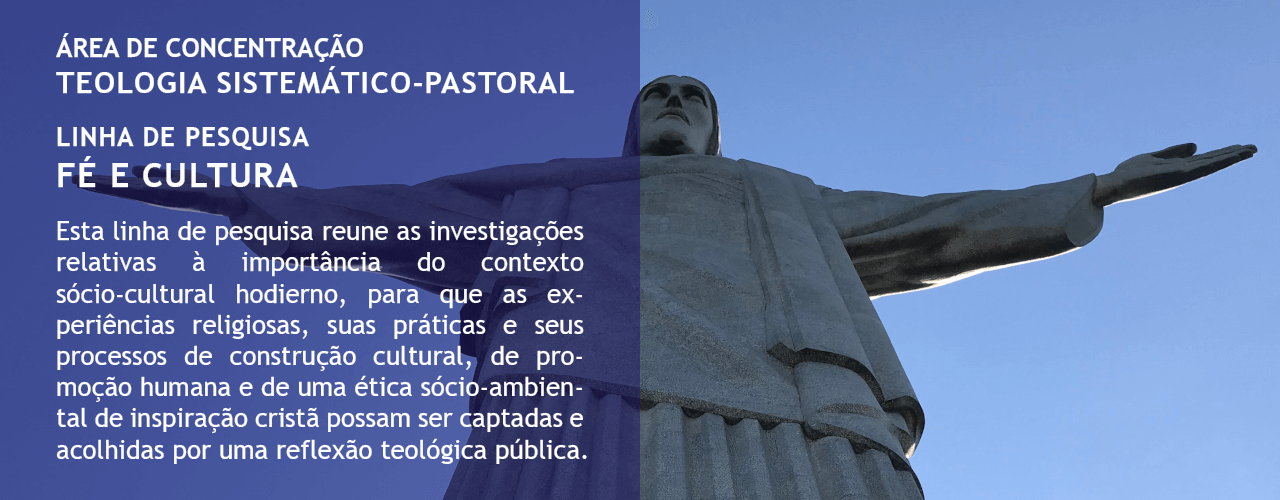
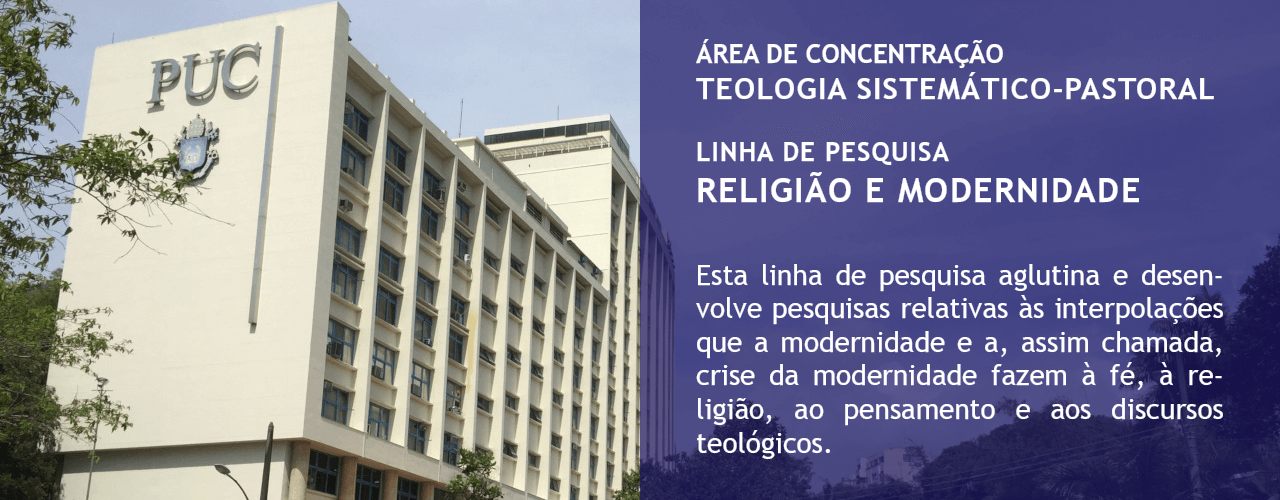
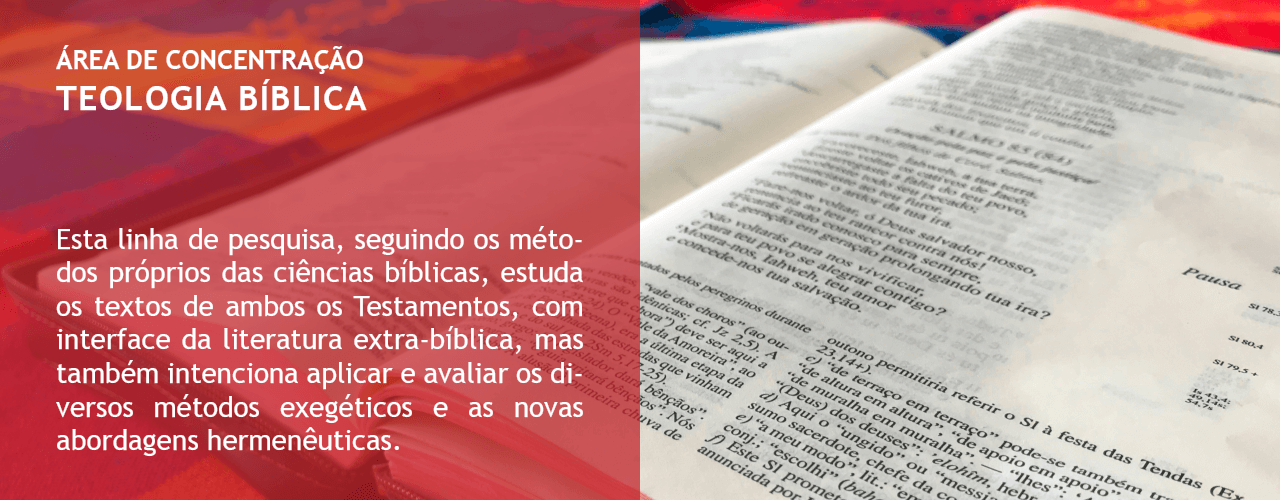
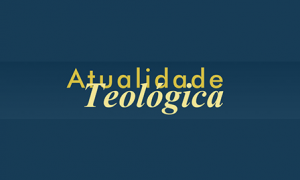
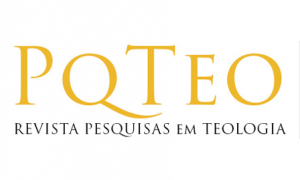

.png)